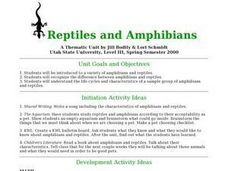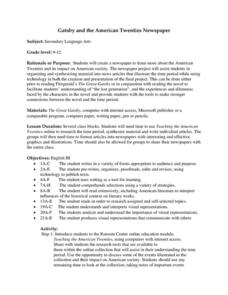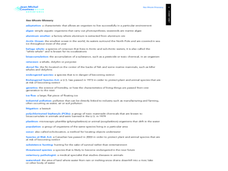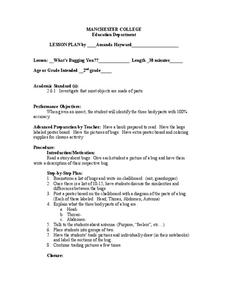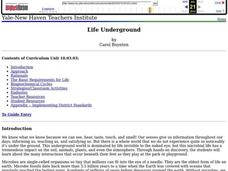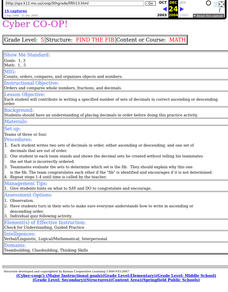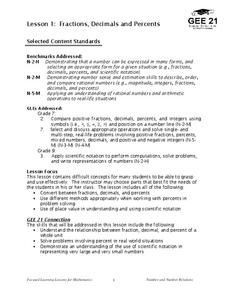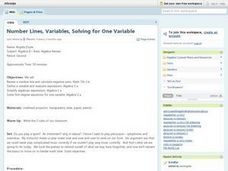Curated OER
The Anaconda
Young scholars examine basic facts about the anaconda. They discuss the length of an anaconda, estimate the length of 33 feet, compare their estimate to the actual length, and decorate the paper snake with colored scales.
Curated OER
Measuring Inches
First graders measure the length of pipe cleaners to form worms using rulers to focus on inches. They record their results and graph the measurement of each pipe cleaner. They measure their pipe cleaner "worms" in various colors and...
Curated OER
Diatoms of Laboratory Indicators of Water Quality
In this science learning exercise, high schoolers use the diatoms present in water in order to test water quality and perform data collection and interpretation.
Curated OER
Gatsby and the American Twenties Newspaper
Students research 1920's US History. In this historical literature instructional activity, students use the novel The Great Gatsby as a tool to examine the era. They work in individually to create newspaper articles based on different...
Curated OER
Beluga Balancing Act
Students study beluga whale populations and the issues they face. In this beluga lesson students compare the issues that the whales are facing and name ways people can help.
Curated OER
What's Bugging You?
Second graders investigate insects. In this parts of a whole, 2nd graders discuss what the three body parts of an insect are as well as the antenna. Students create their own insect labeling each body part and antenna.
Curated OER
Problem Solving
This problem-solving PowerPoint includes detailed steps to follow when solving a math story problem. Each slide describes and gives an example of what a student should ask himself and/or what particular strategy would work in order to...
Curated OER
Life Underground
First graders build a terrarium in order to observe animal and plant life dynamics. In this biology lesson, 1st graders compare how organisms survive in different environments. They write their observations and analysis in their journal.
Curated OER
Earth Forces
Students use geological techniques such as plate tectonics, mountain building, earthquakes, and volcanoes, in order to explain the earth.
Curated OER
Find The Fib - Decimals
Fifth graders count, order, compares, and organize objects and numbers. Each student will contribute in writing a specified number of sets of decimals in correct ascending or descending order.
Curated OER
Bells 'n' Scales
Students work together to arrange bells in order from low to high and play songs. They discuss differences in pitch and musical notation.
Curated OER
Food Pyramid Power: Looking Back and Moving Forward
Students show their knowledge of properties of objects as it pertains to sorting and creating patterns. In this food pyramid power lesson, students show their ability to use whole numbers in different representations by appling...
Curated OER
Beanie Baby
Young scholars investigate the growing of beans by using a creative experiment. They plant and grow beans in a bag before transplanting them. The bean bag is checked several times a day and the data is recorded. The data is analyzed and...
Curated OER
Strange Elevators: Creating and Extending Patterns
Second graders solve problems by recognizing patterns, creating patterns and extending them. They compare and contrast patterns.
Louisiana Department of Education
Fractions, Decimals, and Percents
Fractions, decimals, and percents all say the same thing! Show your classes how to convert between the three forms using visual and numeric representations. Then lead them to an understanding of scientific notation.
Curated OER
Absolute Value Bingo
Learners explore some different concepts in relation to using a number line for instruction. Given some number values, they graph the position on the number line. The lesson ends with them playing Bingo.
Curated OER
Number Lines, Variables, Solving for One Variable
Review basic algebraic rules of addition of integers. Then have the class define a variable and explore methods of solving equations with one variable. They observe solving expressions using inverse operations and simplifying solutions....
Alabama Learning Exchange
Mix it Up! Exploring the Commutative and Associative Properties of Addition
Examine commutative and associative properties with your class. They'll explore the relationships between addition and subtraction and investigate patterns as they solve addition problems. Links to an assessment and a table game are...
CK-12 Foundation
CK-12 Middle School Math Concepts - Grade 6
Twelve chapters cover a multitude of math concepts found in the Common Core standards for sixth grade. Each title provides a brief explanation of what you will find inside the chapter—concepts from which you can click on and learn more...
Houghton Mifflin Harcourt
Unit 1 Math Vocabulary Cards (Grade 4)
Use a set of 12 math vocabulary cards intended for fourth grade mathematicians. The topics of the cards include mostly place value concepts. Each sheet contains two cards; one with the word printed in bold text, and the other with the...
Inside Mathematics
Conference Tables
Pupils analyze a pattern of conference tables to determine the number of tables needed and the number of people that can be seated for a given size. Individuals develop general formulas for the two growing number patterns and use them to...
TELEC
What's Your School Like?
S1 and S2 language learners practice the skills of predicting and scanning as they examine images and read the script of interviews with two young students.
California Education Partners
Photos
Why do all sizes of pictures not show the same thing? Class members analyze aspect ratios of various sizes of photos. They determine which sizes have equivalent ratios and figure out why some pictures need to be cropped to fit particular...
5280 Math
More or Less the Same
Tell the story of the math. Given a graph of a linear system, learners write a story that models the graph before crafting the corresponding functions. Graphs intersect at an estimated point, allowing for different variations in the...


